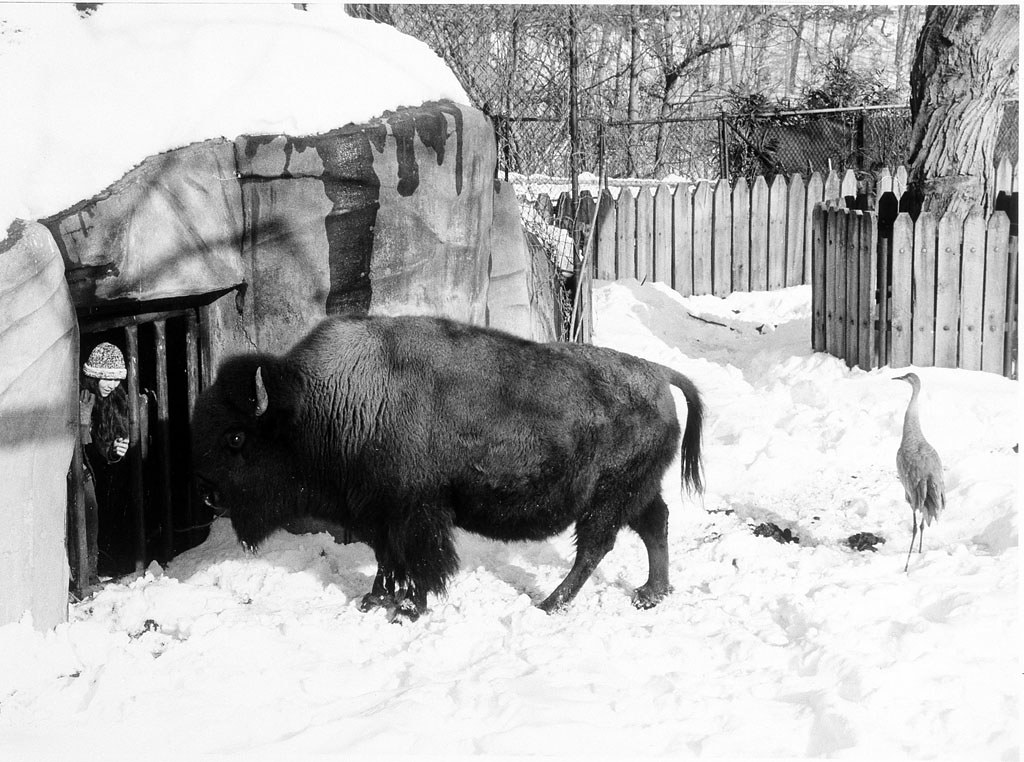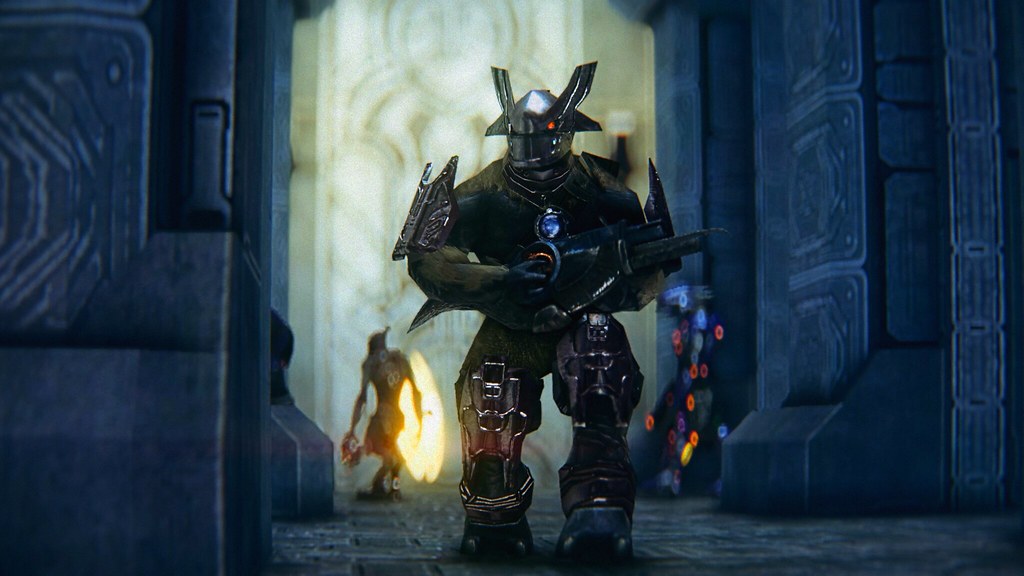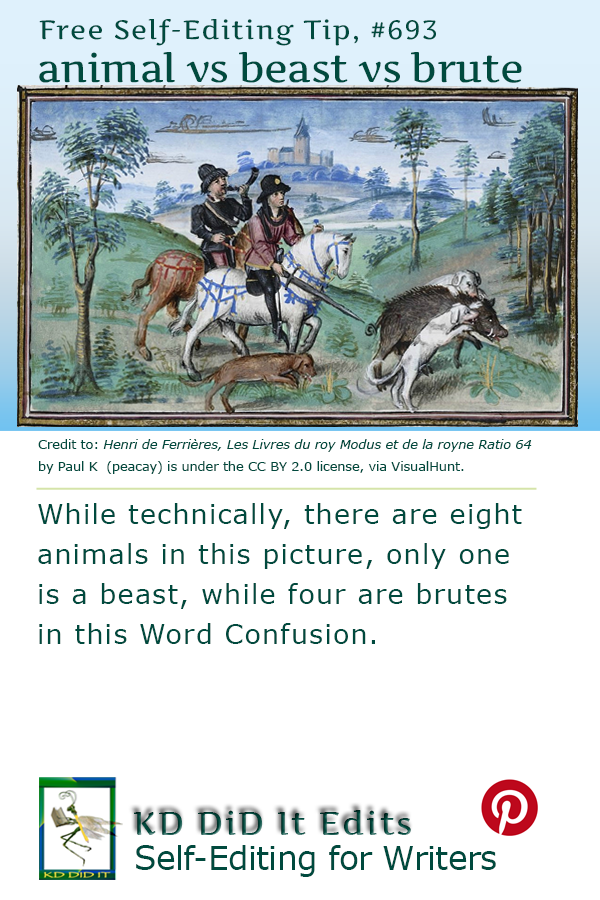Revised as of
31 Aug 2022
Have you figured out the distinction between beast and brute in the Pinterest pin? Yep, the two men hunting down the beastly boar with their two brutish dogs, make it four brutes.
There are indeed some slight distinctions between the three, animal vs beast vs brute, with each succeeding word becoming less human. In so many ways.
As animal, they are humans and creatures who can live, act, and move by themselves. Quite the generic term *grin*
As beast, they are any animal other than human and usually the large or dangerous ones.
As brute, they may be human or beast and both are regarded with contempt or fear.
Word Confusions . . .
. . . started as my way of dealing with a professional frustration with properly spelled words that were out of context in manuscripts I was editing as well as books I was reviewing. It evolved into a sharing of information with y’all. I’m hoping you’ll share with us words that have been a bête noire for you from either end.
If you found this post on “Animal vs Beast vs Brute” interesting, consider tweeting it to your friends. Subscribe to KD Did It, if you’d like to track this post for future updates.
| Animal | Beast | Brute |
|---|---|---|

A Boy and His Dog is under the CC0 license, via Pxhere, <https://pxhere.com/en/photo/1285567>. — Say what you will, they are both animals . . . cute ones. |

NZP Keeper Morna Holden Feeding Animals is courtesy of the Smithsonian Institution and has no known copyright restrictions, via VisualHunt. — That buffalo is definitely a beast. |

Halo: Combat Evolved | The Beauty of SPV3 by Joshua | Ezzell is under the CC BY-SA 2.0 license VisualHunt. — Whoa! I’d hate to meet this brute in a dark alley. |
| Part of Grammar: | ||
| Adjective 1; Noun 2
Plural for noun: animals |
Noun; Verb, transitive
Plural for the noun and third person present verb: beasts |
Adjective; Noun
Plural for noun: brutes |
| Adjective: [Attrib.] Relating to or characteristic of animals
Noun:
[Facetious] A person or thing |
Noun: An animal, especially a large or dangerous four-footed one
Verb, transitive: [Performance] To have excelled at something as if using super-human beast like skills To make a beast of, treat as a beast |
Adjective: Unreasoning and animal-like
Wholly instinctive or physical Without reason or intelligence Coarse and grossly sensual Noun:
|
| Examples: | ||
| Adjective: There is a wide range of animal species. Animal welfare is my chief concern. This is a comparative study of animal and vegetable protein tissues. Oh, you’re an animal! A crude surrender to animal lust, we lay panting in a tangle of sheets. Noun: Humans are the only animals who weep. Even spiders are considered animals. Are humans superior to animals, or just different? The snowfall seemed to have chased all birds, animals, and men indoors. Those men have to be animals — what they did to that boy was savage. One of my neighbors is a political animal. The government that rose after the election was a very different animal. A perfect job? Is there any such animal? She brings out the animal in me. Puh-lease, there is no such animal. |
Noun: Lions are wild beasts. There were these great beasts in the pasture. The gift of reason differentiates humanity from the beasts. He is a filthy drunken beast. That Jody is a scheming, manipulative little beast. The beast in you is rearing its ugly head. And then we come to that much-maligned beast, the rave record. Her latest film is an odd beast. Have you seen that beast of a truck he drives! Verb, transitive: I beasted my exam and got an A. We will not be beasted! Get Williams’ mates! The sarge plans to beast him! |
Adjective: It was a brute struggle for social superiority. Stranded on the island, they had to face up to the brute necessities of basic subsistence. In the end, she used brute force to push him out. It took brute strength, but we managed to turn the car back over. Ozzie implemented a brute force attack to find the password. We will achieve little by brute force. Noun: What an unfeeling little brute you are. “None of the brute creation requires more than food and shelter.” – Henry David Thoreau, Walden We, unlike dumb brutes, can reflect upon our impulses. That crawler was a great brute of a machine. |
| Derivatives: | ||
| Adjective: animalistic, animalian, nonanimal, semianimal, superanimal Noun: animalcule, animality, animalization, nonanimal, semianimal Verb, transitive: animalism, animality, animalize |
Adjective: beasting, beastly, beastlier, beastliest, bestial Adverb: beastly, bestially Noun: beastie, beasting, beastliness, bestiality |
Adjective: brutal, brutelike, brutish Adverb: brutally, brutely, brutishly Noun: bruteness, brutishness |
| History of the Word: | ||
|
Middle English from the Old French beste is based on the Latin bestia. | The adjective was around in Late Middle English and is from the Old French brut(e), which is from the Latin brutus meaning dull, stupid. |
C’mon, get it out of your system, bitch, whine, moan . . . which words are your pet peeves? Also, please note that I try to be as accurate as I can, but mistakes happen or I miss something. Email me if you find errors, so I can fix them . . . and we’ll all benefit!
Satisfy your curiosity about other Word Confusions on its homepage or more generally explore the index of self-editing posts. You may also want to explore Book Layout & Formatting Ideas, Formatting Tips, Grammar Explanations, Linguistics, Publishing Tips, the Properly Punctuated, Writing Ideas and Resources, and Working Your Website.
Resources for Animal vs Beast vs Brute
Apple Dictionary.com
The Free Dictionary: beast
Urban Dictionary: beasted
Pinterest Photo Credits:
The edges of Henri de Ferrières, Les Livres du roy Modus et de la royne Ratio 64, <https://visualhunt.com/f2/photo/8089759194/85a21288b0/>, by Paul K were cleaned up and straightened in Photoshop and is under the CC BY 2.0 license, via VisualHunt.


